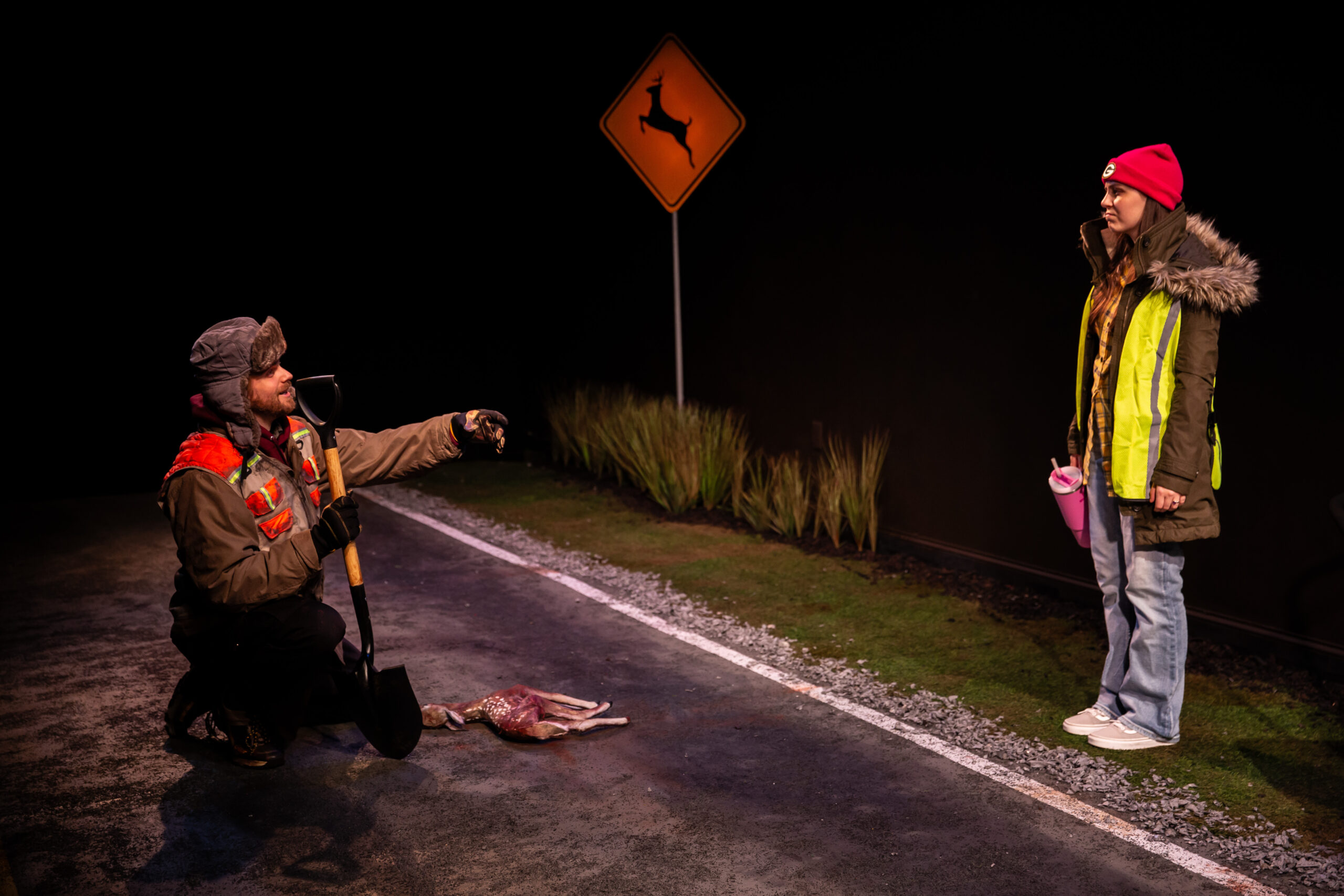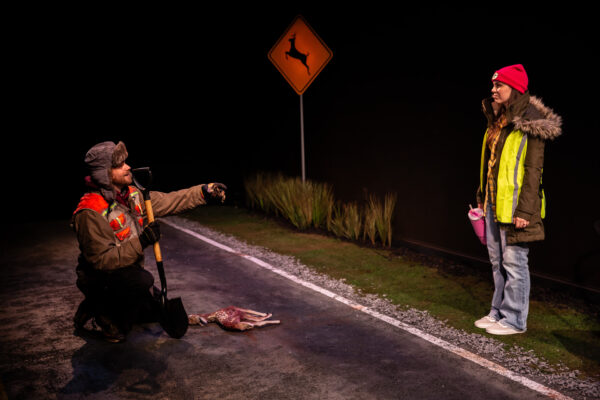
D. B. Milliken and Mia Sinclair Jenness in Road Kills. Photo: Nina Goodheart
I suppose it is not surprising that a play called Road Kills–a play that opens with the corpse of a young fawn at center stage, ironically loomed over by a Deer Crossing road sign–wends its way through a series of dark and darker turns. The road kills are quite literal (and viscerally present onstage thanks to Sean Frank’s alarmingly good props) and the narrative structure proceeds through a series of eruptions of vehicular violence–and that’s not even taking into account the play’s dealing with physical, sexual, and animal abuse; alcoholism; suicidal ideation; and the deeply destructive things that can happen inside families. (The website contains two separate content warnings with different levels of detail, if you’re concerned about your own limits.) What is surprising, and pleasantly, is the high degrees of nuance, emotional complexity, and wry humor in both Sophie McIntosh’s script and Nina Goodheart’s remarkably buoyant direction.
Our two main characters, Jaki (Mia Sinclair Jenness) and Owen (D. B. Milliken), are paired up in the least “meet-cute” way possible, out of which the two nonetheless distill an edgy, ambiguous chemistry. College student Jaki has been sentenced to six weeks of community service working for Owen, who has the roadkill retrieval and cleanup contract for their rural Wisconsin county; the entire play takes place on the single horizontal plane of Junran “Charlotte” Shi’s middle-of-nowhere roadside set, which makes excellent use of the long, narrow space.
Structurally, the script is cleverly built, with the passage of time between Jaki’s weekend shifts noted by interstitial pre-recorded scenes, each of which uses sound and the passing of headlights to illustrate the demise of the next piece of roadkill Jaki and Owen will have to wrangle. (Paige Seber’s lighting and Max Van’s sound along with solid voiceover work from a number of guest artists make these scenes both genuinely suspenseful and darkly funny. The successive corpse reveals, too, walk that line between comedy and horror.)
Jaki and Owen seem to have nothing in common: Jaki’s a hard-partying, foulmouthed attitude problem with a whole sawmill’s worth of chips on her shoulder and zero interest in taking anything in her life seriously. Owen’s a gentle, shy, and sensitive guy who tries to find meaning in his brutal job; lives with and takes care of his widowed mother; began running the family business at sixteen, a few years after his father’s death; and prays over the souls of the animals they manage. But as we see them work together and start to relax into each other’s company, if not exactly to enjoy it, certain resonances appear. Like Owen, Jaki is fated–or burdened–to inherit a family business: she’s the heiress to Johnson Brothers Farms, a bull semen empire. Neither of them necessarily would have chosen the path they’re set on, but neither can see a way out, though Owen offers to help Jaki try. And both are dealing, in very different ways and coming from very different places, with shame and unhealed wounds stemming from traumas in their pasts that continue to deform their presents.
The lines of psychological cause-and-effect McIntosh draws here can feel a bit too simplistic, with Jaki’s path and Owen’s self-consciously opposed to each other, but there’s still plenty of richness in the characters to keep us engaged. Goodheart’s delicate hand with her actors and layered performances from both Jenness and Milliken mean that even when we can see where Road Kills is going, there’s unpredictability in how we get there.
Jaki acts out overtly and on every axis she can find, and Jenness finds every note of both her vulnerability and her volatility: She’s sexually aggressive and brashly interested in casual hookups over relationships, yet she twitches in revulsion at an unanticipated touch. She delights in shocking the sheltered Owen with graphic descriptions of her sexual escapades. She’s abusing alcohol in a way that may have started as a coping mechanism but has already reached physical dependence and visible personality alteration. And she has a complete shutdown when she’s triggered by certain events, including here the possibility of having to get in a car with the family member who sexually abused her when she was a child (Michael Lepore).
Conversely, Owen has retreated inward. His placid, mild surface isn’t a lie, and nor are his genuine kindness and sensitivity, but he’s almost completely socially isolated. Milliken brings a generosity that’s more than naivete, and that lets us see the glimpses of pain that underlie Owen’s willed goodness. Outside of the community service cases from whom he derives a little extra income and the occasional pet owner whom he has to notify of tragedy, his personal connections are limited to his mother and his dog. And to the extent that he recognizes his own loneliness, his shame leads him to think he deserves it.
We get the impression that his other community service placements have come and gone without denting the surface. But once Owen both recognizes Jaki as a weird sort of local celebrity (she appears on the billboard for her family’s business) and starts to be alarmed by the casually shattering details she lets slip about her life, their relationship starts to deepen, week by week, until a mixed-up snarl of Owen’s fraternal magnanimity, Jaki’s need to constantly confirm her own sexual agency, Jaki’s genuine trauma reactions, and Owen’s fierce protectiveness leads them down a dangerous path to a series of horrifying revelations that will shatter everything they’ve built.
Again, this could so easily be unremittingly grim, but McIntosh and Goodheart have a firm grip on the play’s tricky tone, giving us permission to laugh in the darkness and recognize the genuine moments of emotional connection even if they’re about to be stripped away. The overall excellent production lifts the whole endeavor, even as I struggle to process some of its horrors. And there are a lot of horrors in Road Kills: from gory physical violence to wrenching reminders of the worst things humans can do to one another and to other living creatures. It’s unsettling and often upsetting, but I’ll be watching to see what all of these artists do next.
